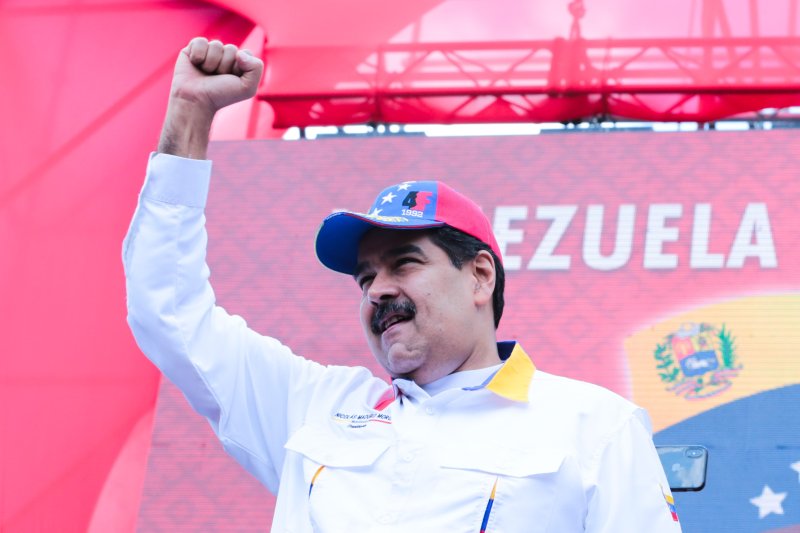Venezuelan President Nicolas Maduro as he welcomes supporters participating in an 'anti-imperialist' protest, at the Miraflores Palace, in Caracas, Venezuela. Photo by Prensa Miraflores/EPA-EFE
Jan. 6 (UPI) -- The United States underestimated Russian support of the Maduro regime and was considering imposing further sanctions against Venezuela and its officials, a senior U.S. official said Monday after President Nicolas Maduro forcefully installed a new National Assembly head.
U.S. Special Representative for Venezuela Elliott Abrams told reporters in Washington, D.C, that in the last year, President Nicolas Maduro has increasingly relied on Russia as he becomes more desperate under the economic and political pressure applied by the United States against his country.
Russian companies, he said, now handle more than 70 percent of Venezuela's oil industry, growing its importance in the South American country's economy.
"We underestimated the importance of the Cuban and Russian support of the regime, which has proved, I think, to be the two most important pillars of support for the regime and without which it wouldn't be in power," he said.
The United States has been plying economic sanctions against Venezuela since last year when Maduro's re-election was deemed illegitimate and National Assembly President Juan Guaido appointed himself interim president.
More than 55 countries back Guaido's presidency and Abrams said Maduro's forceful installation of Congressman Luis Parra as National Assembly president while military officials barred opposition lawmakers and Guaido with batons and shields from participating in the vote has prompted countries that have not staked a position to voice concern, including Mexico and Argentina.
Maduro's only allies left are Cuba, Russia, China and "a few odd dictatorships around the world," he said.
While Mexico said, "the legitimate functioning of the legislative power is inviolable in democracies" in criticism via Twitter, Argentina said in a statement it "deeply regrets" what happened and condemned "the acts of harassment suffered by deputies, journalists and members of the diplomatic corps at the time of attempting to enter the premises of the National Assembly."
The Venezuelan opposition lawmakers were forced to hold separate elections at a local newspaper where Guaido received a tally of 100 votes to zero to reclaim his position with a quorum of the 167-member legislature.
Abrams said the behavior of the Maduro regime to block the officials from the election was proof of its failure.
"If the regime had had the votes, it would not have ordered soldiers to keep elected deputies out of the National Assembly in shameful scenes you've seen in videos," he said. "Those actions have been condemned and rejected by countries all over the world."
Asked where the situation in Venezuela is now after the installation of Parra and with Maduro seemingly still holding tight to power after a year's onslaught of sanctions Abrams said the Maduro regime came out of the election "weaker" than before.
"What you saw yesterday was something the regime didn't want to do. Initially, they wanted a vote, and they wanted to win the vote in the National Assembly, and they couldn't do it ... and they were forced to this last desperate resort of using the military, knowing that what we saw has actually happened," he said.
The United States will now consider how to use funds voted by Congress to support the opposition and further impose sanctions against the Maduro regime.
"We are looking at additional sanctions, personal sanctions, economic sanctions that we think will bring more pressure yet on the regime," Abrams.
On Tuesday, Guaido is expected to attempt to enter the National Assembly as its head and it is unknown if he will be allowed to enter, he said.
"As you know from all those videos yesterday, soldiers physically prevented him from going in," he said. "Will they tomorrow? We'll see."















